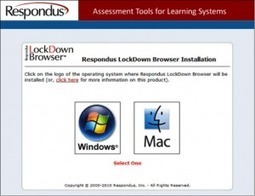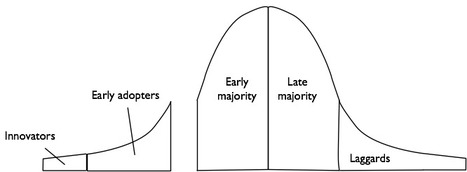 Your new post is loading...
 Your new post is loading...
WGU Texas and three community colleges — Sinclair Community College in Ohio, Broward College in Florida and Texas' own Austin Community College — have received a shared $12 million dollar grant from the U.S. Now that approach, in which students advance after proving their mastery of a concept rather than after a predetermined amount of time in a class, is poised to move from the internet to the physical campuses. “There is nothing magic about online and competency-based,” said Mark Milliron, the chancellor of WGU Texas.
Let's say Professor Smith wanted to use Understoodit. She would start by creating an account and choosing the screen name 'smith'. Professor Smith would then tell her students to go to understoodit.com/smith on their laptop, tablet or smartphone. When students are confused they would click the 'confused' button, and when they understand they'd click 'understood', and in real-time Professor Smith can see the percentage of students that understand. It's that simple. Professor Smith's students only need to create accounts if she wishes to keep track of their progress or answers. This means that Professor Smith can use Understoodit at conference presentations, even if her audience members don't have Understoodit.com accounts.
Turnitin, the leader in originality checking and online grading, announced the results of a new study analyzing instructor feedback on 2,093,396 student papers submitted through GradeMark, the Turnitin online grading tool.
By Sheryl Grant "The disruptive potential of badges in higher ed makes for compelling headlines, but the real nuts-and-bolts innovation is happening at ground level. I thought I would contribute something to Amy’s question by taking a look at the variety of badge systems being designed for colleges and universities. I started with HASTAC's higher ed tag in the Badges for Lifelong Learning topic on Scoop.it, but please add others I may have missed in the comments section below."
Via Jim Lerman
Colorado State University's online Global Campus decided to accept transfer credits for the computer-science course after a faculty panel reviewed it.
So I’ve taken a different approach this semester. I’m teaching a first-year writing class, so there will be a lot of writing. And I’ve told the students that I will only be awarding straight letter grades on their essays—no pluses or minuses. My thinking behind this decision is that while it might be hard to know the difference between an 87 and an 88, or sometimes even between the dreaded B+/A- split, I absolutely do know the difference between an A and a B paper. I expect to see a sharp drop in the amount of stress that I feel as I grade the four essays I’m assigning this semester.
License CC BY-NC-SA Some rights reserved by Clint Hamada There was a reasonable amount of discussion at the #pleconf last week on the role of e-portfolios... What I am saying is that the original purpose of the e-portfolio continually gets subverted to the needs of the institution and the academic. Surely this is anathema in an age of supposed student centredness.
The following list of articles and websites contain much useful advice on writing good multiple-choice questions.
To make the student experience go smoothly, we recommend that instructors create a brief, non-graded exam that requires the use of Respondus LockDown Browser. The practice exam will familiarize students with the software and ensure that it has been installed properly.Another helpful tool is the student version of the Respondus LockDown Browser Quick Start Guide (available from the Resources area of CourseSites.) It’s just one page and can be easily distributed.
There is little argument that reflective writing is a good way to foster critical thinking, encourage self expression, and give students a sense of ownership of their work (Chretien et al. 2012, Kennison and Misselwitz, 2002). Almost every academic discipline includes content on which learner reflection is appropriate; so the problem, typically, is not in creating the assignment but rather in assessing the work. How do we place a fair and equitable grade on an assignment that has so many variables? What are we looking for in our students’ work that we can reward and encourage with a good grade?
Assessment in microblogging enhanced courses Carmen Holotescu Mirella Mioc Gabriela Grosseck University Politehnica/ Tims...
Via Maria João
AS many as 125 students at Harvard University are being probed for allegedly cheating in a final exam at the elite institution, administrators said last Thursday.
In early 2010 Todd Bacile started hearing from companies about a new measure they were using to help decide whom to hire: the Klout score, a number that calculates a person’s online influence based on his or her presence across various social-media networks. So when Mr. Bacile began teaching an electronic-marketing class at Florida State University last year, he created a Klout-based project worth 10 percent of the final grade. Klout.com calculates “influence” based on a user’s level of engagement on sites like Twitter, LinkedIn, Google+, and Facebook. It then assigns a score on a scale of 1 to 100, with the average score being 40.
|
In this interview, Kirsten Winkler, Innovation Editor at Today's Campus, talked with Steve Clark, Associate Director, Academic Support and Instructional Systems for Athens State University in Alabama. Steve explains how Athens State is successfully using the new remote proctoring feature of McGraw-Hill's Tegrity product, and what experiences students and faculty had during the testing phase. He also gave an outlook on the future of remote testing and online education in general.
McGown and Lightbody felt that students needed instruction beyond the guidelines and that they needed repeated instruction in subsequent courses, especially those courses in the major. Not all fields handle the use of sources in the same way. Once students are in a major, they need to learn the particulars of referencing for that field.
MARY has written extended essays on commerce but she is no business student. She has completed assignments on Chinese Tang dynasty poetry and Asian history but she is no lover of humanities. Mary is an academic ghost writer who helps students cheat by doing their work. For the past three years Mary, 21, has written essays for other students in return for cash.
Plenty of Web sites offer to write students’ papers or complete their assignments for a fee. But they appear to be growing more aggressive in promising to get students good grades for no work; some even promise to take entire online courses for students.
Analytics in Higher Education: Benefits, Barriers, Progress, and
Recommendations The objectives of this research were to assess the current state of analytics in higher education, outline the challenges and barriers to using analytics, and develop a maturity index to provide a common means of assessing progress in analytics. Key Findings - Analytics is widely viewed as important, but data use at most institutions is still limited to reporting. - Analytics programs are most successful when various constituents—IR, IT, functional leaders, and executives—work in partnership. - Where analytics is concerned, investment is the area in which higher education institutions are making the least progress. - Institutions should focus their investments on expertise, process, and policies before acquiring new tools or collecting additional data. - Institutions that have made more progress in Investment, Culture/Process, Data/Reporting/Tools, Expertise, and Governance/Infrastructure are more likely to use data to make predictions or projections or to trigger action in a variety of areas.
Update: It’s not just eportfolios 16 September, 2012 – for some reason today has seen a fair bit of interest in this post from over 3 years ago. I though I’d take the opportunity ... "In the typical e-portfolio product there is an assumption that the students’ only place for learning is the host institution. It ignores the observation that students attend multiple learning institutions (including work-place training) and it ignores that most learning is informal. In other words, an institution that plays a very small part in the learning of a student expects the student to place all of their “demonstrates, resources and accomplishments” onto the institution’s server." "The types of support and encouragement you give to the early adopters has to be radically different than that you give to the mainstream. Time and time again, I have heard senior university folk express the opinion “We’ll concentrate on the people that are keen”. This perspective only entrenches this gap, it only makes certain that the mainstream won’t engage. It’s a mistake."
We eLearning developers are used to the question, “Which is better, eLearning or classroom instruction?” The answer is, “It depends.” It’s the same answer if one asks, “Which are better, multiple-choice or essay questions?” Either question type is useful for assessing a variety of levels of thinking, depending on how well the designer crafts the questions. Designing multiple-choice questions is not as daunting a task as one might think.
Manor New Technology High School in Manor, Texas, is a 100 percent project-based learning school.
Via Grant Montgomery
Mobility matters-especially at Purdue University. Purdue has developed and deployed a large suite of digital technologies designed to improve student success. Passport: A learning system that demonstrates academic achievement through customizable badges. Passport guides students through tasks by providing a framework to submit documents, share links, complete quizzes, or gather approvals. Instructors can follow each student's progress and connect badges with course objectives. With the system's badge-builder tool, instructors can select different styles, colors, icons and fonts for each badge, or upload their own images. They also can set expiration dates for challenges, or reset tasks when a student's first attempt is not satisfactory. Achievements — such as essays, online discussions, blog posts and podcasts, to name a few — can then be translated into a numeric-based evaluation system for grading purposes.
Once a test is designed, teachers do not have a voice in the content. [...] it assumes that the content being tested is aligned with local or state standards as well as beliefs as to what is important to know.
In order to better understand what leads students to cheat, colleges and universities need to break the code of silence and apply their own academic methods to the problem...
Open Badges are (adapted from Doug’s presentation above): * visual representations of achievements, learning, skills, interests, competencies – anything you want the badge to represent,
* a complement to traditional education ‘certification’,
* capable of accommodating formal or informal pathway for learning,
* representative of hard & soft skills, peer assessment, and ‘stakable lifelong learning’,
* snapshots of learning wherever or however it occurred,
* ‘stealth assessment’!
|



 Your new post is loading...
Your new post is loading...






























